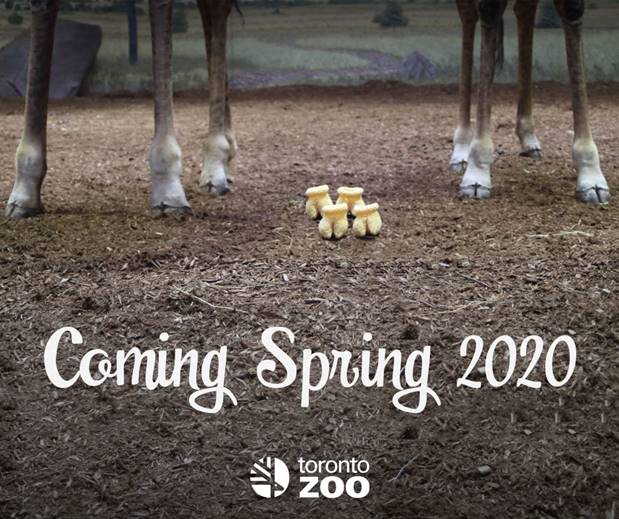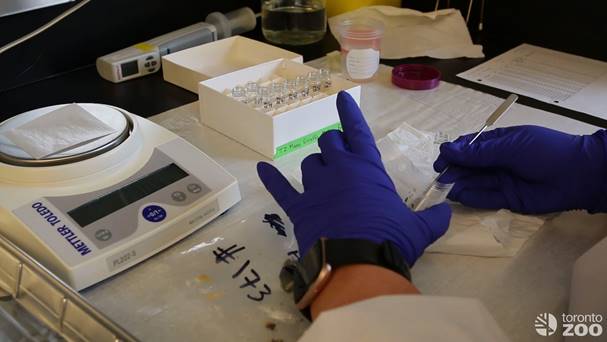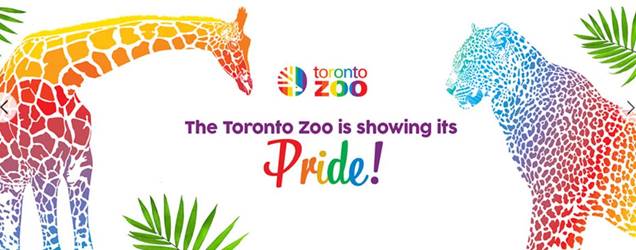
THE TORONTO ZOO HAS SOME EXCITING NEWS!
FEMALE MASAI GIRAFFE MSTARI IS EXPECTING HER FIRST CALF

Toronto Zoo Reproductive Sciences Lab –
How Can You Tell If A Giraffe Is Pregnant?
TORONTO, ON, Friday, June 21, 2019: It’s World Giraffe Day and the Toronto Zoo is excited to announce that female Masai giraffe Mstari is expecting her first calf! Mstari is five months into her 15-month-long pregnancy, just past the first trimester. Based on her conception date of January 18, 2019, the calf is expected arrive in mid-April 2020. However, giraffe pregnancies can range from 400-488 days in length, so there is considerable difficulty in pinpointing a due date. The future first-time parents are Mstari, born October 17, 2013 at the Toronto Zoo, and Kiko, born October 22, 2012 at the Greenville Zoo in South Carolina.
The Toronto Zoo’s Reproductive Sciences branch began tracking Mstari's reproductive cycles in the Wildlife Health Centre using fecal hormone analysis in the summer of 2017. At that point, daily fecal collections showed that Mstari was mature and had a 14-day cycle, typical for Masai giraffes. Since then, Wildlife Care Keepers have closely followed Mstari's reproductive cycles, and breeding between Kiko and Mstari was observed in early and mid-January 2019. A lack of breeding activity in at the end of January was the first sign of a suspected pregnancy. Using fecal hormone analysis, elevated progesterone (pregnancy hormone) levels were confirmed on February 26, 2019, indicating early pregnancy for Mstari. Wildlife Care Keepers are continuing to collect fecal samples three times a week throughout her pregnancy in order to add to the global dataset of hormone levels in pregnant and post-partum giraffes.
The Toronto Zoo is excited that Mstari has reached the five-month milestone, but there are still ten months before the calf is expected to arrive, and it will be some time before Mstari starts "showing." Since this will be Mstari's first calf, Wildlife Care Keepers are preparing for a higher risk pregnancy, birth, and neonatal period, since (as with all first-time moms) it is unknown how Mstari will react to the arrival of the baby. In addition, just as with human parents, keepers are getting ready to baby or ‘calf’-proof the giraffe habitat, researching the best substrates for birthing and ensuring safe spaces for a baby giraffe.
“This pregnancy is an important contribution to a genetically healthy Masai giraffe population,” says Eric Cole, Acting Director of Wildlife and Welfare. “Masai giraffes are under increasing pressure due to habitat loss and illegal hunting. It is important to educate the public on their plight in the wild and do everything we can to prevent the threats they face and halt declining populations.”
In December 2018, the conservation status of Masai giraffes was elevated to Endangered by the International Union for Conservation and Nature (IUCN). Fewer than 35,000 Masai giraffes survive in the wild, having experienced more than a 50% decline in the past 30 years. Illegal hunting and habitat loss are their primary threats. The Toronto Zoo is part of the AZA Masai Giraffe Species Survival Plan (SSP), and with Mstari currently being the most genetically valuable female in the North American Masai Giraffe SSP, this expectant calf is very important. The Toronto Zoo has had 19 giraffes born since 1974 with this upcoming birth being the first third-generation Toronto-born giraffe.
- 30 -
About Toronto Zoo
The Toronto Zoo is Canada’s premier zoo and a national leader in saving wildlife to ensure the rich diversity of nature for future generations. More than a tourist attraction, the Toronto Zoo boasts a number of leading programs for helping wildlife and their natural habitats – from species reintroduction to reproductive research. A world-class educational centre for people of all ages, the Toronto Zoo is open every day except December 25 and attracts approximately 1.3 million visitors each year. Toronto Zoo is accredited by CAZA (Canada's Accredited Zoos and Aquariums) and AZA (Association of Zoos and Aquariums). Look for these logos whenever you visit a Canadian zoo as your assurance that you are supporting a facility dedicated to providing excellent care for animals, a great experience for you, and a better future for all living things. For more information, visit caza.ca and aza.org.
Toronto Zoo Media Contacts:
Katie Gray, Acting Manager of Strategic Communications
[email protected] or #416-392-5941
Amanda Chambers, Acting Supervisor of Strategic Communications
[email protected] or #416-392-5974






